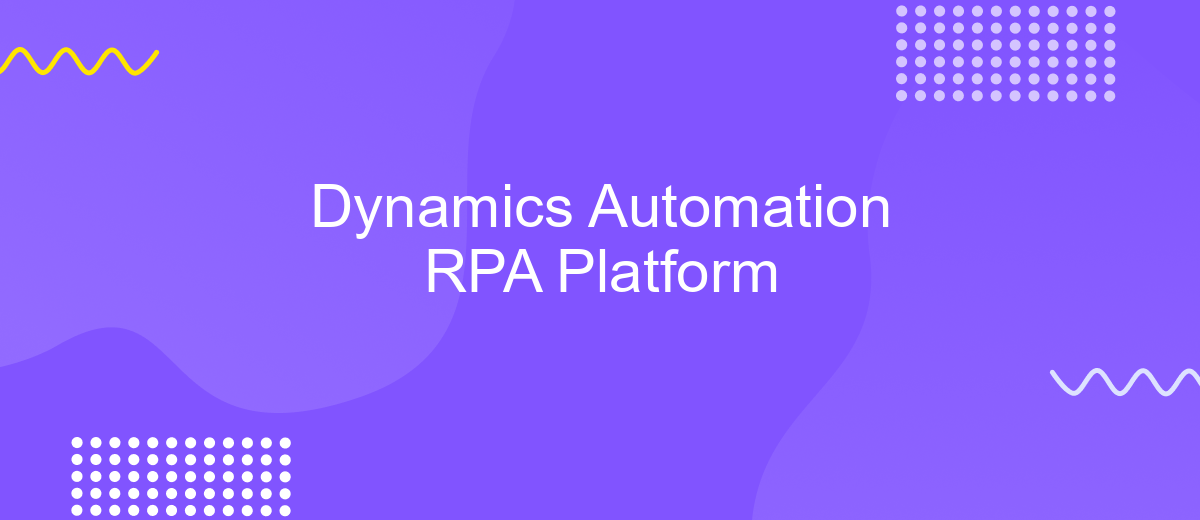Dynamics Automation RPA Platform
Dynamics Automation RPA Platform is revolutionizing the way businesses operate by streamlining processes and enhancing productivity through robotic process automation. By automating repetitive tasks, this cutting-edge platform allows organizations to focus on strategic initiatives and improve overall efficiency. With its user-friendly interface and robust capabilities, Dynamics Automation RPA Platform empowers companies to achieve greater accuracy, reduce operational costs, and accelerate digital transformation efforts in today's competitive landscape.
Introduction
The rapid advancement of technology has paved the way for innovative solutions that streamline business operations. Among these, Robotic Process Automation (RPA) stands out as a transformative force, revolutionizing how organizations handle repetitive tasks. The Dynamics Automation RPA Platform is at the forefront of this revolution, offering a comprehensive suite of tools that enhance efficiency and productivity. By leveraging RPA, businesses can automate mundane processes, allowing human resources to focus on more strategic initiatives.
- Seamless integration with existing systems
- Scalability to accommodate business growth
- Enhanced accuracy and reduced human error
- Cost-effective automation solutions
- Real-time analytics and reporting capabilities
As organizations strive to remain competitive in an ever-evolving market, the adoption of RPA platforms like Dynamics Automation becomes crucial. By automating routine tasks, companies can achieve significant cost savings and improve operational efficiency. Furthermore, the platform's ability to deliver real-time insights enables businesses to make informed decisions swiftly. Embracing RPA not only optimizes current processes but also lays the foundation for future innovation and growth.
Key Features and Benefits

The Dynamics Automation RPA Platform is designed to streamline business processes through advanced robotic process automation. It offers a user-friendly interface that allows organizations to automate repetitive tasks without the need for extensive programming knowledge. The platform's drag-and-drop functionality makes it accessible to users of all skill levels, enabling quick deployment and reduced implementation time. With robust security features, it ensures that sensitive data is protected during automation processes, providing peace of mind to businesses handling confidential information.
One of the standout features of the Dynamics Automation RPA Platform is its seamless integration capabilities. By utilizing services like ApiX-Drive, the platform can easily connect with a wide range of applications and systems, facilitating smooth data flow and enhancing operational efficiency. This integration capability not only reduces manual data entry but also minimizes errors, leading to improved accuracy and productivity. Additionally, the platform's scalability allows businesses to start small and expand their automation efforts as needed, offering a flexible solution that grows with their needs.
Use Cases and Applications

Dynamics Automation RPA Platform offers a versatile solution for businesses aiming to streamline their operations through automation. By leveraging this platform, organizations can significantly enhance productivity and accuracy across various departments.
- Customer Service: Automate repetitive tasks such as data entry and customer inquiries, allowing representatives to focus on complex issues and improve customer satisfaction.
- Finance and Accounting: Streamline invoice processing, financial reporting, and compliance checks, reducing errors and saving time.
- Human Resources: Simplify recruitment processes, employee onboarding, and payroll management, enhancing efficiency and reducing administrative burdens.
- Supply Chain Management: Optimize inventory management, order processing, and logistics coordination, ensuring timely delivery and cost savings.
- IT Operations: Automate routine maintenance tasks, software updates, and system monitoring, improving uptime and reducing manual intervention.
By implementing Dynamics Automation RPA Platform, companies can achieve a competitive edge through reduced operational costs and improved service delivery. This innovative approach not only empowers employees by freeing them from mundane tasks but also ensures that businesses remain agile and responsive in an ever-evolving market landscape.
Implementation Considerations

When implementing a Dynamics Automation RPA Platform, it's crucial to first evaluate the specific processes that will benefit most from automation. Identify repetitive, rule-based tasks that consume significant time and resources. Conducting a thorough analysis of these processes will help in prioritizing RPA deployment and maximizing return on investment.
Another key consideration is ensuring the platform's compatibility with existing systems. Integration challenges can arise if the RPA tools are not aligned with current software infrastructure. It's essential to assess the technical requirements and potential integration issues early in the process to avoid disruptions and ensure a smooth transition.
- Evaluate the scalability of the RPA solution to accommodate future growth.
- Ensure compliance with data security and privacy regulations.
- Provide adequate training for staff to manage and maintain the RPA tools.
- Establish clear metrics to measure the success of the automation efforts.
Lastly, it's important to foster a culture of continuous improvement. Regularly reviewing and refining automated processes can lead to further efficiencies and innovation. Encouraging feedback from users and stakeholders will help in identifying areas for enhancement and ensuring the long-term success of the RPA implementation.
The Future of RPA and Dynamics Automation
The future of RPA and Dynamics Automation is poised for significant growth and transformation. As businesses increasingly seek efficiency and precision, the integration of advanced technologies like machine learning and AI into RPA platforms will become more prevalent. This evolution will enable more sophisticated automation processes, allowing companies to streamline operations and reduce manual intervention. Moreover, the demand for personalized customer experiences will drive the need for dynamic automation solutions that can adapt to changing business environments in real-time.
In the realm of integration, services like ApiX-Drive will play a crucial role in facilitating seamless connectivity between various systems and applications. By automating data transfer and synchronization, ApiX-Drive helps businesses to effortlessly implement and manage integrations, enhancing the overall efficiency of RPA solutions. As organizations continue to embrace digital transformation, the synergy between RPA and dynamic automation will lead to innovative business models and a competitive edge in the marketplace. The future promises a landscape where automation is not just a tool, but an integral part of strategic business development.
FAQ
What is Dynamics Automation RPA Platform?
How can Dynamics Automation RPA Platform benefit my business?
What types of tasks can be automated using Dynamics Automation RPA Platform?
How do I integrate Dynamics Automation RPA Platform with my existing systems?
Is Dynamics Automation RPA Platform secure to use?
Apix-Drive is a universal tool that will quickly streamline any workflow, freeing you from routine and possible financial losses. Try ApiX-Drive in action and see how useful it is for you personally. In the meantime, when you are setting up connections between systems, think about where you are investing your free time, because now you will have much more of it.

